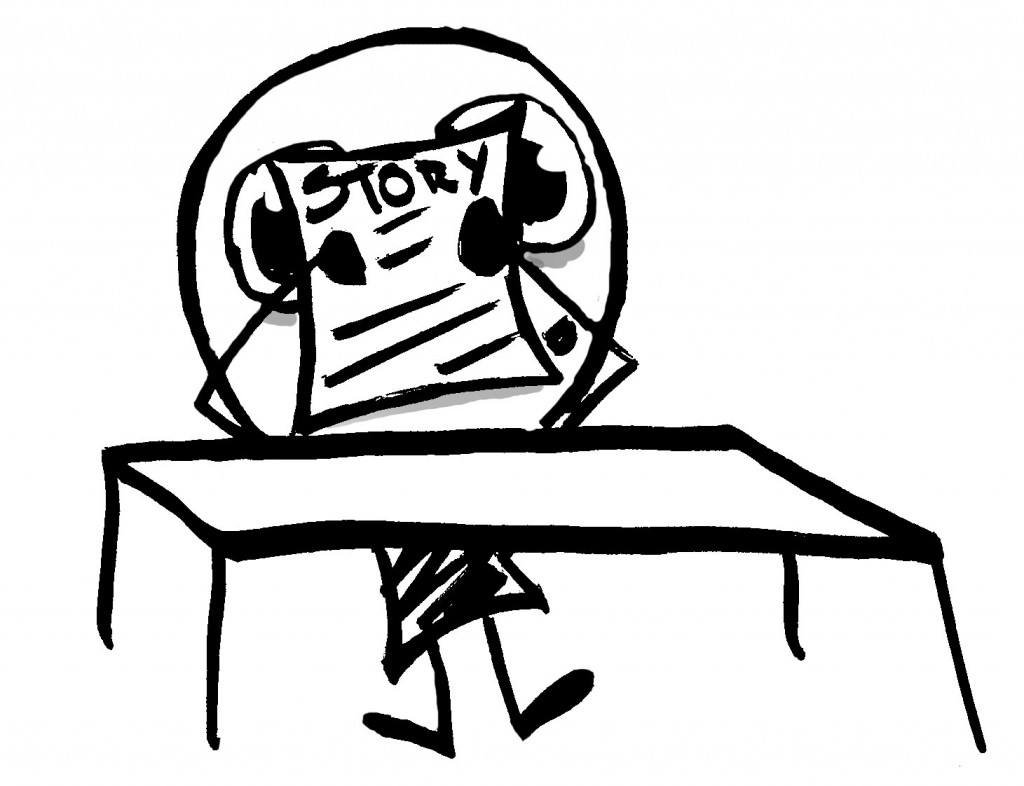So you want to write a story?
It’s no exaggeration when I say that stories are the lifeblood of civilization. In a world full of uncertainty and insecurity, we turn to stories for understanding and guidance. Religions use creation myths to help society embrace its purpose and identity, while politicians exploit their personal narratives for political gain. In both instances these stories affect our understanding of history. In essence, stories facilitate learning, growth, and empathy. They transport us to worlds we’ll never see and allow us to speak to people who never existed. The greatest stories have toppled empires, and even the meekest have managed to touch hearts. Any story (even yours!) holds within it the power to affect a change in ways you’d never have thought possible. All you need to do is tell it.

Sounds pretty great, doesn’t it?
Writing a story is no simple feat, however. The mechanics of storytelling may sound simple, yet crafting a “good” story is anything but. Developing the kernel of an idea into a fully-realized narrative is, as any author will tell you, wrought with terrible emotion. Cutting a beloved scene carries with it feelings of grief, to say nothing of the terror felt when you hit a brick wall and have no idea where next to turn. Or wondering if, when you’ve finished, anyone will even care. The doubt can seem endless.
Still up to the challenge? I hope so, because it is only by experiencing this heartbreak that we are able to grow. And it is through personal growth that the story, which began as a simple idea, has the potential to explode into something else, something much greater!
Still with me?
Excellent.
Then let’s begin by asking: where do I start my story? A straightforward question, yet possibly the most important one you will have to answer. This is the place from which the rest of your story will grow. The starting point of your story is a seed that will, over time, develop into a mighty tree that will only reach its full potential through thoughtful care and effort.
But enough with the metaphors. Let’s talk details.
At the outset of your story, you will need two essential things regardless of length: a character and a conflict. From there, the world is your oyster! Well… almost. Before establishing your character and conflict, before even putting words on paper, you’ve got to have an idea. The first step to writing a story is discovering the inspiration that will carry you through the length of your writing process. It’s only once you’ve got that idea – that inspiration – that you can push forward with decisions like who will do what to whom.
Finding inspiration might sound daunting at first (what with the abstractness of “inspiration” and all), but it’s not that bad. Finding inspiration is, in fact, somewhat of a freeing journey. The process is similar to scribbling random thoughts and sayings all over a blank piece of paper as they occur to you. There’s no right way to draw inspiration from the world… the important thing is to remain open! Many authors, when on the prowl for inspiration, will carry with them a blank notepad and, throughout their day, scribble down whatever any standout thoughts that wander through their heads. Personally, I like to ride the trolley through town, listening in on as many conversations as I can and writing down the juiciest bits that might come up. Anything I hear might one day form the basis for an argument or a deep philosophical rumination in one of my stories. Parks are also a great place to sit and listen, both to those around you as well as to the idle thoughts that might float through your mind.
Another fantastic way to wrangle some good old-fashioned inspiration is to experience it firsthand. Do something you never thought you’d do or put yourself in a position you otherwise would avoid. Something you experience might form the basis for a possible conflict that your character might encounter even if they respond differently than you did. If you’re writing a crime story, for example, there’s an app for your phone that lets you listen in to police dispatch where you might find some exciting dialogue that you can later use. Or maybe your story is about a weary traveler, in which case a roadtrip through desolate country should be at the top of your to-do list so that you get to experience the sense of solitude and despair of the character for yourself. Merely driving along and noting the scenery or the people you pass is one surefire way to develop original material (staying at the dirtiest inn you can find is always a plus, too!).
Now I’m not saying that the best course of action here is to go chasing down firetrucks if you’re in the mood to write about firefighters, but if inspiration is drawing you towards an avenue you’ve always wondered about (and as long as it’s a relatively safe/legal avenue), then don’t be afraid to see where it takes you. Once real inspiration hits, the avalanche of words that have been building will start to fall. And that’ll be where your story truly begins.
makingcomics.com



Great article! I especially liked all the practical things you listed that you can do to fuel your imagination and creativity.
Coming up with new ideas was hard for me for a while, but I realized that I was getting tunnelvision on my ideas and couldn’t think out of that box anymore. I wasn’t open to completely different ideas anymore. I took some distance and one day I saw this great video by John Cleese on creativity. It’s surprisingly very practical, just as you’re describing in your article. The video really helped me with my new comic idea. (If you’re interested you can click my name that has the link to my blog where I wrote about the experience. The specific blogpost associated with this topic is called “Crafting a story – part 1: an idea!”)
Here is the John Cleese video:
This was very inspiring and informative. Something to contemplate. Thank you for sharing.
I like the idea of listening in on conversations. Even though it may be a little intrusive, there are ideas that can be found in strings of communication and interaction that we just don’t pick up on when we are involved in it.
This was really one of my favorite parts of Kevin’s perspective, it is often hard to objectively look at conversations. This is a great tip on how to approach that dilemma differently.
Spot on! And sometimes we haven’t got much choice in whether or not we listen to their conversations (I’m looking at you cell phone trolley yellers!). But getting an entire picture – seeing the person’s full body, the movements they engage in when they’re excited or heartbroken – is something we can only observe if we aren’t a part of their conversation.
That’s very enlightening. Great article I love it.
Really good advise! Thanks.
Yes! Consider writing down things that come to you as you observe others, and do things you wouldn’t normally do.
And there’s so much more you could do.
Consider movies, comics, music videos, books that move you. That excite you! That leave you on the edge of a cliff desperate for more.
What elements of those books leave you in this state? Betrayal? Secrecy? Unlikely allyship? Longing? Forbidden love? The underdog? Jot down your favorite elements on a brainstorming page.
Think about your favorite characters. What kind of people are they? Do they remind you of yourself or someone you wish you could be? Think about the “villain”… What oddly attracts you to the villain? How do you relate to the villain? Is the villain human or just pure evil? Write these things down.
Write your dreams down.
Make note of what themes and genres end up attracting you the most and start there. Any spark of idea, any fragment can be developed so write it all down.
Make a pinterest mood board of all the elements you feel inspired by. The full moon? Rituals? Blood oaths? Tactical samurai? Unsolved mysteries? Coded langues still not understood to this day? AI? Titans? Famous serial killers?
Pin it on a mood board on Pinterest.
Take two to three of your current interests and mash them together in different ways. Give a one line synopsis.
Aliens, beekeeping, Stardew Valley? Quirky farmer meets alien by nearby crop-circle to trade honey for intergalactic space travel.
Plants, witchcraft, AI? It’s 2080 and AI dominate the world, oxygen is machine made, but a little human witch teaches an AI how to properly garden.
Legend of Zelda, Designated Survivor, Food? A royal family is murdered, a distant relative boy who is a mere chef is named prince, but first he must fight his way to the castle… with his chef’s knife.
Get loose and let it all out.
Loved your content Kevin, very well-written and helpful!
I agree with every factor that you have pointed out. Thank you for sharing your beautiful thoughts on this.
Telling your story frees you of negative thoughts. Check this out Why Should You Tell Your Story
Hope this will help. Thank you.
Again, great tips. Mingling, observing and looking at life from someone else’s view point can really help.I’ d say also try an idea, a situation in which you supposedly did something you would never do in real life.
All your suggestions were great. They are food for thought. I was getting ideas as I read the article. I was inspiring and you hit many points that made since. It got me all excited and can’t wait to get started. Thank You